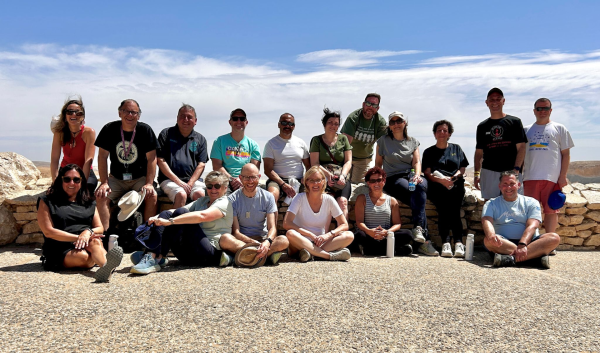By Leah Garber
A Journey Through Israel’s Heart
A group of 13 Jewish Community Center CEOs who participated in JCC Association’s Kivunim onboarding program in recent years—sponsored by the Mandel Foundation—stepped away from their demanding schedules to embark on an extraordinary journey to Israel. The unique seminar offered them a rare opportunity to engage in profound conversations about the broad meaning of Jewish community, explore diverse community models, and gain deep insights into Israeli society—in the context of the current war and beyond.

As an Israeli immersed in our daily reality—breathing the heavy air of the ongoing war surrounded by the collective frustration, disappointment, and mounting anger toward the government and its priorities and sharing in the national anguish for the 59 hostages still held captive by Hamas in Gaza—traveling through Israel with JCC leaders from North America became an unexpected gift for me. Their presence was a refreshing breeze cutting through the oppressive atmosphere, offering a renewed perspective on our shared homeland.
Last week’s seminar unfolded as an intricate narrative—telling the multifaceted story of Israeli society through its remarkable people. History, tradition, social and ethnic diversity, war, and political realities served not as isolated elements but as interconnected threads, woven together into a rich, complex, and uniquely Israeli tapestry.
We witnessed Israel’s resilient spirit during our visit with Zohar, director of Kibbutz Re’im, in the Gaza Envelope. Following October 7, the entire community was uprooted to an urban complex in the bustling heart of Tel Aviv—a stark high-rise environment worlds apart from their pastoral kibbutz life. Only recently have some members begun the journey back to their homes, scarred dwellings that stand waiting, eager to embrace their returning families. Zohar shared profound insights into community resilience, unwavering commitment to foundational Zionist values, and the power of mutual responsibility, while honestly acknowledging the immense challenges, deep trauma, and personal losses each member of the kibbutz continues to bear.
Our journey led us south to the hallowed grounds of the Nova Music Festival, where we stood solemnly on soil forever marked by the blood of 364 innocent lives and more than 30 police officers who fell trying to save them. Beneath silent eucalyptus trees that bore witness to unimaginable atrocities, we felt the overwhelming transformation of this space—how ground that once pulsed with the joyful energy of dancers suddenly convulsed with the desperate flight of terrified revellers seeking shelter from merciless attackers. We could almost hear the haunting shift from music and laughter to anguished cries and desperate pleas. Smiling faces of the fallen looked out at us from memorial pillars—vibrant Israelis, full of life and promise, whose voices were silenced and whose smiles were forever frozen in an instant of barbarity. The magnitude of this collective loss remains unfathomable and immeasurable.
At Kibbutz Kfar Aza, one of three communities that suffered the most devastating toll, we met Shachar, a man whose enormous heart and luminous spirit shine despite unspeakable tragedy. He painted a vivid picture of his kibbutz during happier times, when more than 900 members built meaningful lives together and then recounted the massacre that shattered their world. Today, only 14 members have found the courage to return. Shachar vulnerably shared the agonizing dilemma facing the community: Should they demolish the homes that bear the violent scars of hatred—burned, bullet-riddled, desecrated structures that testify to unspeakable horrors—and build anew as a symbol of healing and renewal or should they preserve them as silent testimonies to one of history’s darkest hours? Amid the destruction, we encountered inspiring young Israelis who, having completed high school, postponed their military service to move south to help rebuild these communities with their own hands, breathing new life into devastated spaces.
We were moved by Liron and Gefen, two former shlichot (emissaries) who, immediately upon completing their missions abroad, chose to relocate to Israel’s vulnerable south to live alongside kibbutz residents, supporting their journey toward rehabilitation and renewal.
Through the writings and the humble walls of David Ben-Gurion’s desert home in Kibbutz Sde Boker, we connected with the enduring legacy of Israel’s founding prime minister, an exemplar of modesty, diligence, unwavering love for the land, and Zionism. As we absorbed the timeless desert landscape with its wild, ancient beauty, we found ourselves surrounded by high school students tracing the same paths, visiting the same significant sites. In their youthful enthusiasm and engagement with their heritage, we glimpsed the promising future of the State of Israel.
The Israeli mosaic expanded further as we met Eli, Tamar, and Daniel, dedicated to fostering meaningful connections between Jerusalem’s Jewish, Muslim, and Christian communities. Racheli, an ultra-Orthodox Gur Hasidic woman, courageously shared insights into her community’s complex relationship with Israeli society. Nadine, a Muslim Israeli community center director, spoke of her work improving lives in East Jerusalem’s Arab neighbourhoods while building bridges with Jewish residents across the city.
Over nine profoundly moving days, the multifaceted story of Israeli society unfolded before us, prompting the JCC leaders to reflect deeply on their own identities, their commitment to strengthen the chain of Jewish continuity, and their unique contributions to the beauty, diversity, and richness of our shared heritage. This unbroken chain includes Zohar, Shahar, Liron, Gefen, Ben-Gurion, Nadine, Racheli, Daniel, Tamar, Eli—and extends to embrace all of us, the entire Jewish people, in Israel and throughout the Diaspora.
I was extremely honored to participate in this extraordinary experience—to share these stories and also to absorb them with wonder and humility. Thanks to my dear friends, the Kivunim JCC executives, I returned home with renewed strength and perspective, nourished by encounters with the remarkable people of my beloved homeland, deepening my already abiding love for this extraordinary country and its resilient spirit.
Together, united, we will overcome.
Leah Garber is a senior vice president of JCC Association of North America and director of its Center for Israel Engagement in Jerusalem.